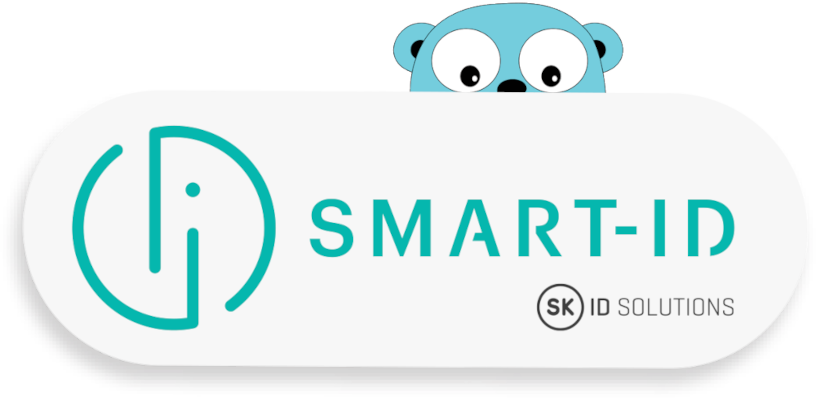
Intro
Package smartid implements an interface in Go to work with the
Smart-ID API (https://www.smart-id.com). Smart-ID is used to easily and
safely authenticate and sign documents online using only a smart phone.
Smart-ID is a popular method in the Baltic countries of Estonia, Latvia,
and Lithuania for authenticating and signing documents online for banks,
social media, government offices, and other institutions.
Official Smart-ID technical documentation.
Installation
go get github.com/dknight/go-smartid
Usage
The bare minimum required to make an authentication request. Demonstarates
synchronous way.
For more examples see full docs.
Sync request
semid := NewSemanticIdentifier(IdentifierTypePNO, CountryEE, "30303039914")
client := NewClient("https:sid.demo.sk.ee/smart-id-rp/v2/", 5000)
request := AuthRequest{
RelyingPartyUUID: "00000000-0000-0000-0000-000000000000",
RelyingPartyName: "DEMO",
Hash: GenerateAuthHash(SHA512),
Identifier: semid,
}
resp, err := client.AuthenticateSync(context.TODO(), &request)
if err != nil {
log.Fatalln(err)
}
if _, err := resp.Validate(); err != nil {
log.Fatalln(err)
}
certPaths := []string{"./certs/TEST_of_EID-SK_2016.pem.crt"}
if ok, err := resp.Cert.Verify(certPaths); !ok {
log.Fatalln(err)
}
identity := resp.GetIdentity()
fmt.Println("Name:", identity.CommonName)
fmt.Println("Personal ID:", identity.SerialNumber)
fmt.Println("Country:", identity.Country)
Async way using channel
Another example contains many more quest parameters for the signing method.
Sign and Authenticate methods are similar and you can use the same
AuthRequest parameters for both of them.
This examples is asynchronous uses channel.
semid := NewSemanticIdentifier(IdentifierTypePNO, CountryEE, "30303039914")
client := NewClient("https://sid.demo.sk.ee/smart-id-rp/v2/", 5000)
request := AuthRequest{
RelyingPartyUUID: "00000000-0000-0000-0000-000000000000",
RelyingPartyName: "DEMO",
Hash: GenerateAuthHash(SHA384),
HashType: SHA384,
Identifier: semid,
AuthType: AuthTypeEtsi,
CertificateLevel: CertLevelQualified,
AllowedInteractionsOrder: []AllowedInteractionsOrder{
{
Type: InteractionVerificationCodeChoice,
DisplayText60: "Welcome to Smart-ID!",
},
{
Type: InteractionDisplayTextAndPIN,
DisplayText200: "Welcome to Smart-ID! A bit longer text.",
},
},
}
resp := <-client.Sign(context.TODO(), &request)
if _, err := resp.Validate(); err != nil {
log.Fatalln(err)
}
certPaths := []string{"./certs/TEST_of_EID-SK_2016.pem.crt"}
if ok, err := resp.Cert.Verify(certPaths); !ok {
log.Fatalln(err)
}
identity := resp.GetIdentity()
fmt.Println("Name:", identity.CommonName)
fmt.Println("Personal ID:", identity.SerialNumber)
fmt.Println("Country:", identity.Country)
For more examples see docs.
What is not included
:private/ endpoint.- Better certificated parsing and data extraction. You can get certificated
from response, verify and parse it in own way
response.Cert.GetX509Cert().
- Smart-ID API version v1 is not supported, only v2.
Testing
SK test environment is very unstable. Possible technical problems might be:
- Problems with service availability. Doesn't work too often.
- They change test data without any warning.
- Problems with certificates.
- Problems with performance requests can last very long time, sometimes
408 Timeout will be given as response.
go test
Troubleshooting
Problems with certificates
x509: certificate signed by unknown authority
If in development you get an error x509: certificate signed by unknown authority. Then you need to install SK test certificates to your system.
Install certificates from directory ./certs to your operating system.
Fedora Linux example:
sudo cp ./certs/TEST_of_* /usr/share/pki/ca-trust-source/anchors/
sudo update-ca-trust
Then you can verify your certificate, but don't forget to replace with your
personal certificate in production.
certPaths := []string{"./certs/TEST_of_EID-SK_2016.pem.crt"}
if ok, err := resp.Cert.Verify(certPaths); !ok {
log.Fatalln(err)
}
Contribution
Any help is appreciated. Found a bug, typo, inaccuracy, etc.? Please do not
hesitate and make pull request or issue.
License
MIT 2022-2023




